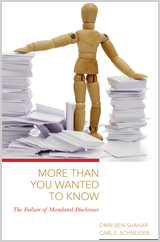 Have you read your iTunes contract–the one that Apple asked you to read and accept before using the service? No? Neither have I. It’s 55 pages long. How about the mortgage disclosures that accompanied your last refinancing? In Illinois, you would need to read 49 disclosure forms spread out over 101 pages. When I refinanced my mortgage, the huge stack of disclosures induced a faint bout of nausea but no wisdom. A professor who teaches contract law and banking law, I quickly gave up trying to understand what I was reading.
Have you read your iTunes contract–the one that Apple asked you to read and accept before using the service? No? Neither have I. It’s 55 pages long. How about the mortgage disclosures that accompanied your last refinancing? In Illinois, you would need to read 49 disclosure forms spread out over 101 pages. When I refinanced my mortgage, the huge stack of disclosures induced a faint bout of nausea but no wisdom. A professor who teaches contract law and banking law, I quickly gave up trying to understand what I was reading.
The law overflows with disclosure mandates even though it is pretty obvious to everyone that they hardly do any good. Instead, they confuse and frustrate buyers. In this terrific book, Omri Ben-Shahar and Carl Schneider exhaustively describe this phenomenon. Mandatory disclosure is law’s biggest and phoniest panacea, as they amply demonstrate.
The appeal of mandatory disclosure laws is easy to understand. They seem like a good way to protect buyers without interfering with the seller’s power to choose terms that protect its interests–an early form of “nudge.” And while in certain circumstances they can do good, they more often cause the seller to game the system by reducing quality along dimensions that the disclosure mandate does not cover, leading the government to force the seller to disclose more and more. The upshot is that consumers are overwhelmed with information they can’t understand.
In a kind of infinite cycle to hell, courts strike down contracts because buyers can’t pick out a key term among the Borges’ library of information, and sellers protect themselves by pointing out the most important terms and demanding that buyers initial them. I can’t remember how many terms I was required to initial in my mortgage but it was surely dozens. (I didn’t read any of them as an act of defiance and self-preservation.) Eventually, people will be required to initial every sentence of 100-page contracts and be required to take exams that test their understanding before being allowed to go home with their toaster or space heater. We will understand every last detail of everything we buy but have no time to use it.